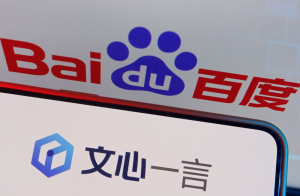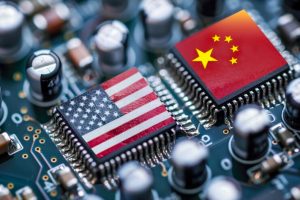US chipmaker Nvidia has asked its distributors to scrutinise their customers in Southeast Asia amid concerns around its artificial intelligence chips ending up China.
Nvidia is not allowed to sell most of its most advanced AI chips to China as part of export controls imposed by Washington aimed at hobbling Beijing’s advanced in semiconductors.
But Chinese universities and research institutes have managed to obtain those banned chips through server products made by Super Micro Computer and Dell Technologies, according to a Reuters investigation from earlier this year.
Also on AF: Congress to Vote on New Curbs on US Investment in China
Those findings have prompted the US Department of Commerce to ask Nvidia to look into how its products ended up in China, according a report by The Information, which cited a person close to the department.
That has prompted Nvidia to ask big distributors, including Super Micro and Dell, to conduct spot checks of their customers in Southeast Asia, the report said.
The Information reported that five different people involved in smuggling Nvidia chips said they had managed so far to evade detection during recent inspections by Super Micro.
Some of the customers duplicated serial numbers of the servers containing Nvidia chips that they purchased from Super Micro and attached them to other servers that they had access to, the report said, citing a person close to Super Micro.
In some cases, smugglers even altered the serial numbers in the operating system for the servers, the report said.
An Nvidia spokesperson said the company insists that its customers and partners “strictly adhere to all export control restrictions.”
“Any unauthorized deviation of previously-owned products, including any grey market resales, would be a burden on our business, not a benefit,” the spokesperson said in an emailed response.
Heightening chip tensions
Meanwhile, Dell said the company requires its distributors and resellers to follow all applicable regulations and export controls.
The company added that it takes appropriate action “up to and including termination” of its relationship if a partner is not adhering to these obligations.
Super Micro said it investigates and takes action against any unauthorized exports or re-exports of its products by third parties.
“Supermicro follows all US export control requirements on the sale and export of GPU systems to regions and parties that require licenses under the Export Administration Regulations,” the company told Reuters.
The Commerce Department did not respond to a Reuters request for comment.
Nvidia’s probe comes as Washington is increasingly trying to clamp down on flows of advanced technologies to China.
Last month, the US ordered Taiwanese chip giant TSMC — the largest maker of contract chips in the world — to stop deliveries of all advanced AI chips designed by Chinese technology firms.
That was after a TSMC chip was found in one of China’s most advanced ‘homegrown’ chips — the Ascend 910B designed by Huawei Technologies.
- Reuters, with additional editing by Vishakha Saxena
Also read:
Nvidia Holds Talks With China Even As New US Chip Curbs Loom
Smuggling Network Selling Nvidia Chips to China’s Military
Korea Firm Smuggled 53,000 Banned US Chips to China
Nvidia Chip Prices Take a Hit in Duel With China’s Huawei
Nvidia ‘Facing $1bn Fine’ as China Opens Anti-Monopoly Probe
China’s Huawei, SMIC ‘to Ramp Production’ of Newest AI Chip
US Cuts China Chip Firm From ‘Military Ties’ List After Lawsuit
US Chips ‘Not Safe’ to Buy, Chinese Industry Bodies Claim
Huawei, SMIC Set to Defy US Sanctions With 5nm Chips: FT
US May Sanction China’s DRAM Chip Giants Next, Analyst Warns
Huawei’s China-Made 7nm Chip ‘Years Behind US’, Raimondo Says
China Threatens to Cut Off ASML Over New US Chip Curbs
US Chipmaker Fined $500,000 for Chips Sent to China – NYT
























